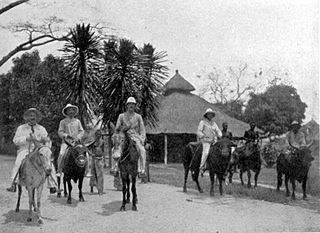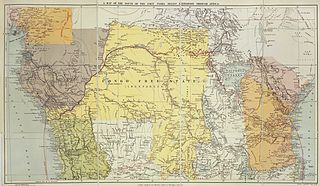| |||||
| Decades: | |||||
|---|---|---|---|---|---|
The following lists events that happened during 1886 in the Congo Free State .
| |||||
| Decades: | |||||
|---|---|---|---|---|---|
The following lists events that happened during 1886 in the Congo Free State .
| Date | Event |
|---|---|
| April | Camille Janssen replaces Francis de Winton as Administrator-General |
| 3 September | Administrator-general Camille Janssen defines nine districts in the colony, each headed by a district commissioner: [1]
|
| 22 November | The Mission sui iuris of the Belgian Congo is established from territory taken from both the Apostolic Prefecture of Lower Congo (in Cubango, Angola) and the Apostolic Vicariate of Two Guineas (in Gabon) |
| 27 December | Compagnie du Congo pour le Commerce et l'Industrie (CCCI) is created, the first Belgian colonial society to be involved in exploration and exploitation of the Congo. [2] |

The Congo Free State, also known as the Independent State of the Congo, was a large state and absolute monarchy in Central Africa from 1885 to 1908. It was privately owned by King Leopold II, the constitutional monarch of the Kingdom of Belgium. In legal terms, the two separate nations were in a "personal union". The Congo Free State was not a part of, nor did it belong to Belgium. Leopold was able to seize the region by convincing other European states at the Berlin Conference on Africa that he was involved in humanitarian and philanthropic work and would not tax trade. Via the International Association of the Congo, he was able to lay claim to most of the Congo Basin. On 29 May 1885, after the closure of the Berlin Conference, the king announced that he planned to name his possessions "the Congo Free State", an appellation which was not yet used at the Berlin Conference and which officially replaced "International Association of the Congo" on 1 August 1885. The Free State was privately controlled by Leopold from Brussels; he never went there.

The Berlin Conference of 1884–1885, also known as the Congo Conference or West Africa Conference, met on 15 November 1884, and after an adjournment concluded on 26 February 1885, with the signature of a General Act, regulating the European colonisation and trade in Africa during the New Imperialism period. The conference was organized by Otto von Bismarck, the first chancellor of Germany at the request of King Leopold II. The General Act of Berlin can be seen as the formalisation of the Scramble for Africa that was already in full swing. Some historians however warn against an overemphasis of its role in the colonial partitioning of Africa, and draw attention to bilateral agreements concluded before and after the conference. The conference contributed to ushering in a period of heightened colonial activity by European powers, once made the point that the Berlin Conference of 1884–85 was responsible for "the old carve-up of Africa". Other writers have also laid the blame in "the partition of Africa" on the doors of the Berlin Conference. But Wm. Roger Louis holds a contrary view, although he conceded that "the Berlin Act did have a relevance to the course of the partition" of Africa. Of the fourteen countries being represented, seven of them – Austria-Hungary, Russia, Denmark, the Netherlands, Sweden–Norway, the Ottoman Empire and the United States – came home without any formal possessions in Africa.
The Congolese franc is the currency of the Democratic Republic of the Congo. It is subdivided into 100 centimes. However, centimes no longer have a practical value and are no longer used. In April 2022, 2,000 francs was equivalent to US$1.

South Kasai was an unrecognised secessionist state within the Republic of the Congo which was semi-independent between 1960 and 1962. Initially proposed as only a province, South Kasai sought full autonomy in similar circumstances to the much larger neighbouring state of Katanga, to its south, during the political turmoil arising from the independence of the Belgian Congo known as the Congo Crisis. Unlike Katanga, however, South Kasai did not explicitly declare full independence from the Republic of the Congo or reject Congolese sovereignty.

The eel catfish is an airbreathing catfish found in the muddy swamps of the tropics of Central Africa. It grows up to 32.7 cm in total length, and is notable for its ability to propel itself out of the water to catch prey.
The Compagnie du Kasai was a Belgian company established to exploit the resources of the Kasai River basin in the Congo Free State. At first it was mainly involved in harvesting wild rubber, but later moved into palm oil and mining.

Félicien Cattier (1869–1946) was a very prominent Belgian banker, financier and philanthropist. He was also professor of law at the Free University of Brussels. He was governor of the powerful trust, the Société Générale de Belgique and chairman of the Union minière du-Haut-Katanga amongst many other companies.
This is a survey of the postage stamps and postal history of the Democratic Republic of the Congo, formerly Zaire and the Belgian Congo.

Kasai District was a district of the Congo Free State, Belgian Congo and the Democratic Republic of the Congo, named after the Kasai River. It was formed around 1885 and went through several large changes in extent in the years that followed. The 1933 version of the district roughly corresponded to the former Kasai-Occidental province and the present Kasaï and Kasaï-Central provinces.
Ubangi District was a district of the Congo Free State, Belgian Congo and Democratic Republic of the Congo. It went through various significant changes in extent.
Bangala District was a district of the Congo Free State and the Belgian Congo. It went through various significant changes in extent. The eastern part very roughly corresponded to the present province of Mongala.
Stanley Falls District was a district of the Congo Free State. It covered most of the eastern part of the colony along the Congo River south from Stanleyville.

The Districts of the Congo Free State were the primary administrative divisions of the Congo Free State from 1885 to 1908. There were various boundary changes in the period before the Congo Free State was annexed by Belgium to become the Belgian Congo.
Banana District was a district of the Congo Free State and Belgian Congo. It disappeared in a reorganization of 1910.

The Compagnie du Congo pour le Commerce et l’Industrie (CCCI) was a private enterprise in the Congo Free State, later the Belgian Congo and then the Democratic Republic of the Congo, whose subsidiaries engaged in a wide range of activities in the Congo between 1887 and 1971. These included railway and river transport, mining, agriculture, banking, trading and so on. It was the largest commercial enterprise in the Congo for many years. It went through various mergers in the years that followed before its successor Finoutremer was liquidated in 2000.
The Société anonyme belge pour le commerce du Haut-Congo (SAB) was a private enterprise in the Congo Free State, later the Belgian Congo, that operated a string of trading stations in the Congo River basin, and exported ivory, rubber and other local products. The ruthless treatment of the local people by SAB agents inspired Joseph Conrad to write his 1899 novel Heart of Darkness.
The following lists events that happened during 1885 in the Congo Free State
The following lists events that happened during 1888 in the Congo Free State.

Charles Lemaire was a Belgian officer and explorer of Central Africa. He was known for his voyages of discovery and the detailed reports he wrote of his expeditions and his time as an official in the Congo Free State. Lemaire was also the first director of the Colonial University of Belgium which existed in Antwerp from 1920 to 1962, and was the first true promoter of Esperanto in Belgium.